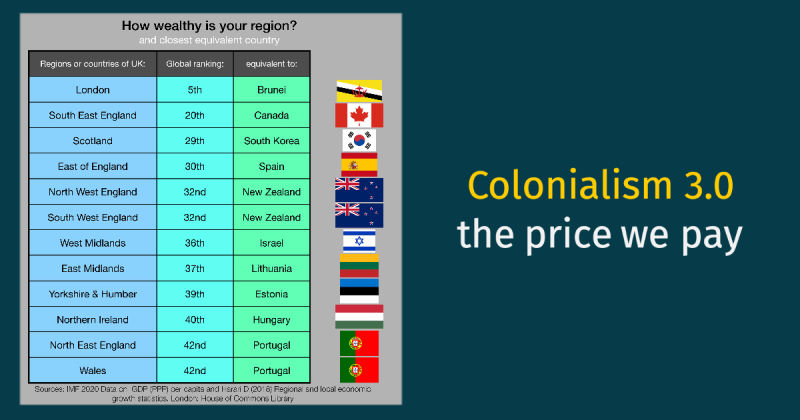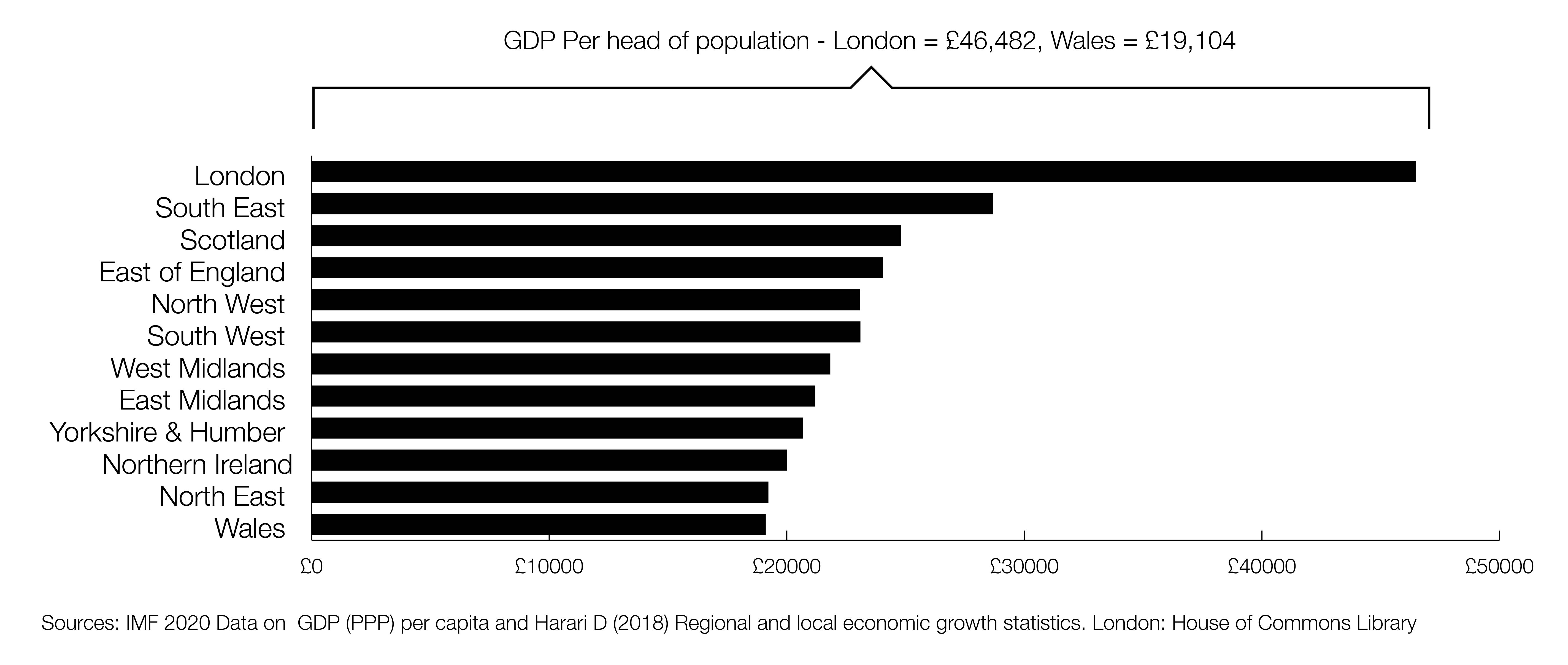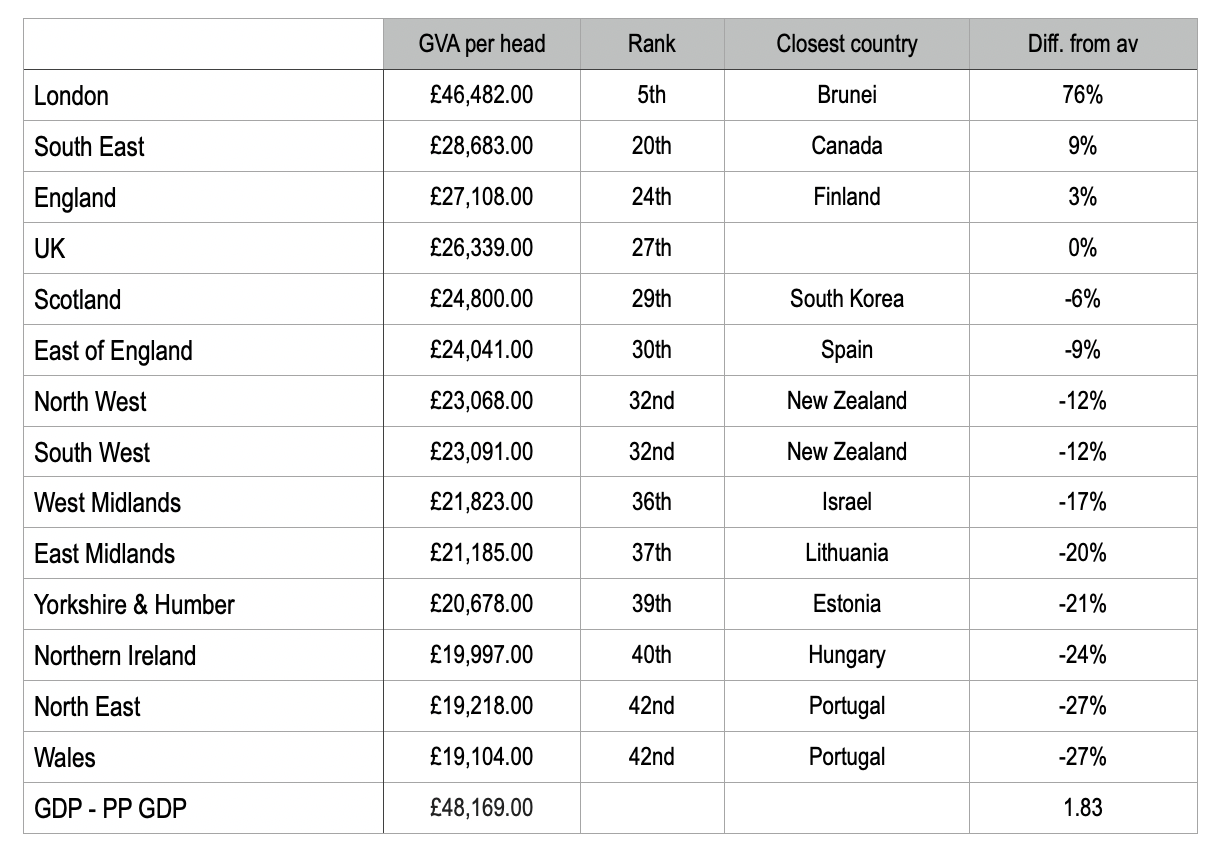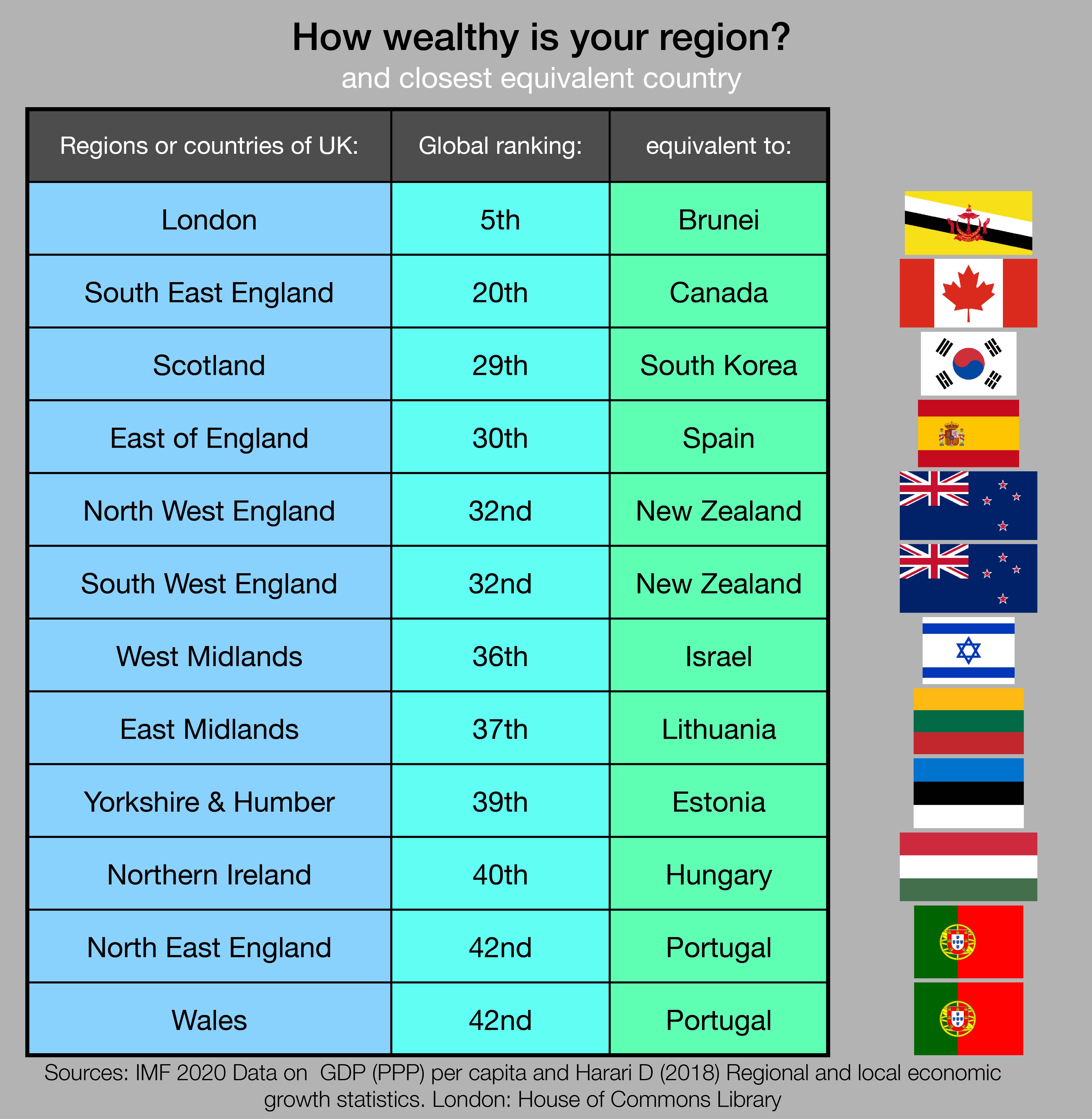Colonialism 3.0
The UK is subject to colonial-style rule by its own leaders.

When our Prime Minister says we are the fifth-richest economy in the world this is reported as fact; even when anyone with a modest level of curiosity can quickly discover that this is a lie.
Firstly, it ignores the impact of looking at the real value of our currency. If you do that, by using data on purchasing power parity, then it turns out we are the ninth largest economy in the world. But ninth largest is not the ninth richest. The UK is a relatively populous country. The ‘true’ measure of economic wealth is GDP per head of population, and by that measure the UK is the 27th richest economy; a second division team at best.
But things look really different if you look inside the UK. Again, our national media tend to look at everything from a London perspective, while ignoring the huge internal disparities in national wealth. As the Figure 1 below shows there are enormous differences in the relative wealth of the regions of the UK. For instance, per capita GDP for London is £46,482 compared to £20,740 for Yorkshire.

Figure 1 Per Capital GDP (PPP) by Region or Country of UK
In fact we can go further and map GDP (PPP) per capita back on to the international league tables. It then turns out that London’s economy is equivalent to the fifth wealthiest country in the world, richer than Brunei, whereas Yorkshire would be 39th, about the same as Estonia. If these were football league tables Yorkshire - once at the vanguard of the world’s economy - would be about to be relegated to the third division.

Table 1 Per Capital GDP (PPP) by Region or Country of UK

Figure 2 UK Regions Compared to Countries by per Capita GDP (PPP)
Of course we might thank our lucky stars that Yorkshire is still part of the same country as London, for we tend to assume that some part of of London’s great wealth must surely be redistributed back to Sheffield. However when we look at the real figures it turns out that nothing could be further from the truth. The Centre for Welfare Reform's recent analysis of all public expenditure in Sheffield (benefits and services) compared to the national average found:
- Per capita public spending in Sheffield is £8,761
- Per capital public spending in the UK is £11,642
- Citizens of Sheffield therefore receive on average £2,881 less in public spending than the national average.
- This is equivalent to a loss of £1.7 billion from the economy of Sheffield.
- Local government in Sheffield controls less than 15% of public spending in our city.
The fact that the economies of the North are now equivalent to countries that suffered more than 40 years of colonial exploitation by Soviet Russia is perceived to be ‘our own fault’. We are seen as non-productive, non-competitive and somehow unworthy. The disdain and prejudice which seeps into general political debate is not just the projected prejudices of the powerful in London, it becomes part of our own story. We accept it.
At a meeting about austerity one council leader, who shall remain nameless, said to me:
“Well we had to save the banks. We need them don’t we?”
It still shocks me to think that someone could believe that a bank - the place money goes to die - is part of the real economy. London’s excess wealth is not built on growing things, making things, ‘competing’ or doing anything worthwhile. The excess has been expropriated by banks and other financial organisations, the glassy-mirrored edifices that loom over the capital’s skyline. Thatcher gave to the banking sector the power to, quite literally, make money and it exploits that power by creaming off resources for itself. Central government adds to this injustice by pretending to redistribute resources across the country, while actually holding back much of that money for itself or for its friends in business and civil society.
The UK’s economic system is utterly broken and corrupt; yet we accept it as normal and inevitable.
If the people who occupied these positions of power had a different skin colour from the rest of us then we’d call this exploitative system ‘colonialism’. But we do not see it like that. Instead, while we might moan about London and ‘the Government’, we are much more likely to blame ourselves or those to whom we give the impossible job of trying to run local government under these hostile conditions.
But in order to understand our times I think that looking at this as a form of colonialism may be - while inevitably controversial - still very useful. For colonialism isn’t just about racial exploitation. I think it is useful to think of colonialism as a special form of economic exploitation, and one that quasi-democracies like ours are particularly prone to.
A greedy monarch can take over another’s territory by military victory or by marriage. L’etat c’est moi: the land and those who live there are conceived of as his (or sometimes her) property, subject to the rule of the monarch. This is clearly a model of sovereignty that has a long history; but it is always constrained by the military reach of the monarch. Resistance comes from those threatened by military expansion.
Colonialism works in a rather different way.
Greek states, particularly democracies like Athens, often encouraged citizens to go off and establish new states. This is why the English word colony and is rooted in the Latin word colere - to cultivate. In this first form of colony there is an assumption that the land is not already occupied, although this may or may not have been true. But in principle we can see this as the primary form of colonisation: to establish a new place, as a relatively independent offshoot of the primary place.
In fact it turns out that the Greeks (always ahead of the game) had two different names for colonies:
Apoikía [ἀποικία - apó (ἀπό) “away from” + oîkos (οἶκος) “home”] an independent states, with links and loyalties back to the mētrópolis [μητρόπολις “mother city”].
Emporia [ἐμπόριov, pl. ἐμπόρια “trading place”] trading colonies
However today we tend to understand colonisation rather differently. When Western powers sent troops, priests and merchants to India, Asia, America and Africa they often developed a model of exploitation that made no attempt to found something new. Rather they established a power base within a different world and set about extracting wealth from that country. Critically this model did not attempt to make foreign countries part of the home country - rather it established points of control within the foreign country. This is a strategy we can also see being used by the Roman Empire, which appointed Roman Governors, but which also tried to leave as much of the previous infrastructure in place as possible. They sought to neutralise the threat of resistance, at the lowest possible cost. Often they would seek to support puppet rulers, like the Herodians in Judea, who would provide legitimacy and control on behalf of the Roman Empire.
Ultimately the imperial model of colonisation was a kind of weaponisation of the Greek trading colony. The British Empire was the largest of these trade-based empires. While we tell ourselves all sorts of comforting stories about how benign and honourable it was, the reality is that the British Empire was a system of heartless theft, slavery, murder and genocide. Perhaps 10 million people died in the Great Indian Famine of 1876–1878, caused in large part by the British government’s laissez-faire economic policies and failure to provide emergency supplies. Listing the Empire’s crimes would be exhausting. The fact that we do not know anything about these crimes is part of our current self-delusion.
Today this second wave of economic colonialism has largely broken down or has been converted into a new kind of corporate colonialism where big business, the USA and other world powers exploit countries without recourse to establishing formal colonies or empires. Empire has been privatised.
So what happened to all the old colonialists? What happened to see the administrators of Empire? Is the British Empire really dead?
Increasingly I am beginning to think that what we now suffer from in the UK is Colonialism 3.0. Colonialism 1.0 was about starting new states, perhaps where nobody was living and Colonialism 2.0 was about establishing bases in foreign countries in order to exploit those countries, often combined with military power. But I think Colonialism 3.0 begins when this system of exploitation bends back into the mother country and begins treating its own people as if they were natives of a foreign country.
This will seem extreme. But how else do we explain the vast differences in power and resources within the UK and the progressive worsening of the situation? We may like to think of our country as if it were one giant family, one where we want everyone to thrive. But if the UK were a family then it would be one where parents stole food from the mouths of their own children.
The trick to colonialism is to establish a power base which is effectively independent of the native people, but which also seems like an inevitable force of nature. The best way to achieve such power without accountability is to avoid appearing like a foreign power, but instead to appear like a benevolent force for good. At its most extreme you can even get the colonisers themselves to believe that they are all acting for the benefit of the poor natives. Here are two examples of Colonialism 3.0 from my own life experience:
In the New Labour era I was asked to attend a seminar with a government minister and a think tank (nominally of the Left) where the object under discussion was educational attainment. The think tank proposed that data showed that children from poorer families were more likely to forget what they’d learned at school over the summer. So they proposed that those children needed to spend more of their summer holidays away from their families. No - I am not making this up. Moreover only me and one old-school Labour MP objected with horror to this analysis and its conclusions. The acceptable thing to do was nod along with this madness: the children of the poor are stupider the children of the rich because of poor parenting - the job of Government -by this twisted understanding - was to keep the children away from their parents for as long as possible.
The second example was from the early days of Cameron’s Austerity Coalition. I was attending a session exploring how back-to-work support could be personalised. When I explained that personalisation is fundamentally about trusting and listening to people themselves I could see interest waning - but that was not the most shocking part of the seminar. After my talk Lord Freud entered the room and was asked questions about the emerging Work Programme. When someone asked why local government could not run back-to-work support he simply stated that local government simply could not manage something as complex as this. An extraordinary thing to say for an ex-banker with no relevant life experience or expertise - but perfectly consistent with the underlying assumptions of a colonial system.
These are just anecdotes. But to me they reveal elements of a consistent pattern across the system of UK government:
- People - at least people with lower incomes - are assumed to be stupid, lazy or dangerous. They cannot be trusted with money, power or human rights.
- Local systems of power are also incapable of doing a good job - they need inspecting, monitoring, micro-managing and controlling.
- Local democracy is irrelevant - it doesn’t matter what people choose to do for themselves, they must work to the rules set by Whitehall.
- Devolution means creating local fiefdoms that are entirely dependent upon devolution deals that are also controlled by Whitehall: Mayors are better than parliaments; City Regions are preferable to Counties; Strong Leaders are preferable to councillors making decisions.
To me this feels more like Colonialism 3.0 than straightforward class prejudice or capitalist exploitation of labour (although there are clearly links). It is more a style of governance which the British happily adopted in India and Africa - applied back onto ourselves.
It reminds me also of the history of countries like Spain and Portugal, once great colonial empires. After a period of rapid growth and military superiority, the people that they had colonised fought back. They declared their independence and so the Spanish and Portuguese empires crumbled. This then led to a long period of internal decline. Loss of Empire seems to often lead to conservatism, insularity and decline. This seems to me to be the path that the UK has set itself upon.
If we are going to end Colonialism 3.0 we will need to start acting like those former colonies did, by reclaiming our own autonomy. This is why Scotland and Wales are almost inevitably on a path to independence, because as it stands, there is no way to reimagine the UK in away that their people’s will ever feel their interests are protected. Northern Ireland is a more complex case, but England - my England - may not be quite a lost cause.
I always thought that Ted Heath’s destruction of the old county boundaries in 1972 was one of the most vicious forms of governmental vandalism: taking places and identities people understood and loved and chucking them in the bin for administrative reasons. But those old loyalties and old identities continue, and I suspect that it will be people’s love of Yorkshire, Cornwall, Sheffield or perhaps even places like Westmorland that will help waken our desire to become - not natives of a foreign colony - but proud citizens of our own communities.
I also think we are beginning to rediscover the value of neighbourhoods. Real everyday citizenship must be rooted in experiences of neighbourliness, shared decision-making and responsibility. We cannot be citizens just by casting a vote every 5 years and hoping for the best. Moreover many local areas are beginning to understand how important it is to respect these local communities. Places like Barnsley are intentionally reinvesting time and support back into wards, into villages and neighbourhoods - the places where people’s primary loyalty lies. Local pride and an awareness that this is your own community - where things will only change if we change them - is the fuel of positive social change.
And the beautiful thing about neighbourhoods is that they have been so ignored by political and economic forces they can be revitalised without asking anyone’s permission. We can just change how behave, we can commit ourselves to helping out, connecting and making our neighbourhood real.
But beyond this - if this is to be an opportunity for real political change - we will need to work together to do two fundamentally important things. First, neighbourhoods need borders - just as a garden only thrives with a boundary to define it - so neighbourhoods must be drawn on maps and so we must create the spaces we need to inhabit as citizens. Second, we need to be able to make decisions together - and inevitably and properly these must be democratic decisions. Every garden needs a gardener; every neighbourhood needs a way in which citizens can come together to decide how to protect and improve it.
Boundaries and decision-making are not expensive. They require some time, discussion and organisation. But they are all things we can do now - today - if we have the will. We don't need to break any laws to restore some measure of democratic control to our own neighbourhoods. And while such communities will not immediately be given powers backed by the state they can certainly start organising themselves to claim some of the powers they need to thrive. Especially if they begin to network and mobilise themselves.
Colonialism 2.0 was defeated by those who took seriously the democratic rhetoric of their colonial masters and turned it around upon them:
You say national sovereignty and the democratic will of the people is important - well so do we - so give us our independence.
We can do the same. They say democracy and the will of the people is important; so do we, and we demand the right to make our own decisions about our own communities.
